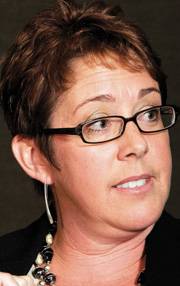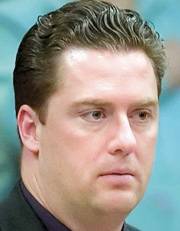Sunday, March 20, 2011 | 2 a.m.
View more of the Sun's opinion section

Lynn Warne

John Oceguera
Sun archives
- Are teachers getting tenure too soon? (1-23-2011)
- Calls to end teacher tenure are bipartisan (9-23-2010)
Getting the two sides in Nevada’s schools debate to embrace “education reform” was the easy part.
The hard part is getting them to agree what it means.
Talks between the teachers union and school districts broke down last month, just as the 2011 Legislature was getting under way. The sticking point was how difficult it should be to fire newly hired teachers and administrators.
Their inability to agree on an issue that experts say is fundamental to improving education — the ability to get rid of bad teachers — underscores how, despite talk of a new era of cooperation among educators, unions and policymakers of both parties, the groups easily fall into their default and stalemated positions.
At the same time, there are signs in Nevada and nationwide that the mood has shifted against teachers on such policies.
The Washoe County School District has sponsored a measure, Senate Bill 39, to change the teacher tenure system. It would extend the probationary period for new teachers and principals from as little as one year to three years. It would also allow administrators to fire probationary employees without notice and with minimal opportunity to appeal.
“We want there to be a clear difference between probationary and post-probationary employees,” said Craig Hulse, a lobbyist for the Washoe district.
The Clark County School District, which over the past five years has seen 95 percent of new teachers granted tenure after their first year, supports the bill.
Nevada is one of just three states, along with Mississippi and Hawaii, to grant tenure in as little as one year — a period some experts say is too short to meaningfully evaluate a teacher’s skills.
The union doesn’t oppose extending the time required to gain tenure. (Thirty-four states require three years in the classroom.)
However, during a confrontational hearing this month, the state’s teachers union did object to making it easier to fire teachers on probation.
Lynn Warne, president of the Nevada State Education Association, which represents teachers and support personnel, said the union supports changing the system but wants to protect due process, including having appeals heard by a third party.
The Washoe district would have appeals heard by the superintendent.
The union also wants the bill to narrowly define “gross misconduct,” a finding that can lead to firing regardless of a teacher’s or administrator’s years of service.
“We have been at the table for months working and supporting positive reforms for education in Nevada,” Warne said. “We are reform-minded. We’re interested as anyone else to have bad teachers removed from classrooms. We don’t protect bad teachers. We protect the process and want it to be a fair process.”
Similar bills are pending in the Assembly, sponsored by Democratic leaders. They say changes to the system will happen, with or without teacher union backing.
“Like all pieces of legislation, it’s better to have universal support,” Assembly Speaker John Oceguera, D-Las Vegas, said. “But if we don’t have total support, this is reform that’s moving forward.”
This presents the possibility, rare in recent memory, for Democratic leadership to go against their political allies in the teachers union.
Assemblywoman Debbie Smith, D-Sparks, who convened education discussions before the Legislature, acknowledged that talks have broken down between union and school district officials.
“At some point, there are philosophical differences,” Smith said. The Assembly bills, which would change tenure and allow veteran teachers to be put back on probation, are “very reasonable.”
The Nevada teachers union has seen the winds shift and tried to reshape its image. But it will only bend so much.
“I’m surprised at their opposition to modest and reasonable reform,” Sen. Greg Brower, R-Reno, said. It doesn’t mean much if union officials say they support change and then don’t support bills to carry it out, he said.
If the Washoe County bill dies, there’s Assembly Bill 229, sponsored by Oceguera, that would set a three-year probationary period for new teachers.
The bill also defines gross misconduct as “any act or omission that is in intentional, wanton, willful, reckless or deliberate disregard of the interests of a school or school district or a pupil.”
For the teachers union, that isn’t specific enough and would lead to court cases and a definition set by the judiciary.
So both sides agree that “gross misconduct” should lead to teacher dismissal. As with broader education reform, agreeing what that means is the hard part.
CORRECTION: The first name of the Washoe County School District lobbyist was incorrect and has been changed. His name is Craig Hulse. | (March 20, 2011)

Join the Discussion:
Check this out for a full explanation of our conversion to the LiveFyre commenting system and instructions on how to sign up for an account.
Full comments policy